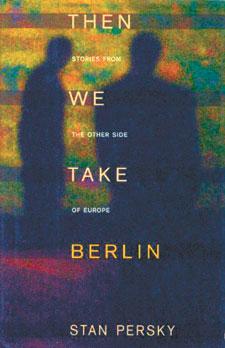In each issue, a prominent literary Canadian recommends a queer-authored book. In this installment, non-fiction writer Daniel Gawthrop recommends Stan Persky’s Then We Take Berlin: Stories from the Other Side of Europe (Knopf Canada, 1995).
Shortly after Then We Take Berlin’s release, a rather obtuse Globe and Mail critic had this befuddled response: “There are two books here: one a book of the mind, the other a book of the body.” Or something to that effect.
The critic was troubled by the presence of sex — homo sex at that — in a book presumably “about” politics. Of course, his mind/body dichotomy completely misses the point: Stan Persky’s exploration of life in eastern Europe after the fall of the Berlin Wall is a post-modern tour de force whose strength lies in its seamless transitions between the subjective and the objective, the journalistic and the philosophical, the aesthetic and the sexy.
Berlin is the second book in Persky’s Boyopolis trilogy — all ruminative, non-fiction memoirs that explore the connections between homo desire, representation and epistemology. (The first, Buddy’s: Meditations on Desire, is a tribute to Roland Barthes and is set in a Vancouver hustler bar. The third, Autobiography of a Tattoo, is a collection of essays about gay desire and its taboos.)
In Buddy’s, the beauty of ephebes (or “seekers of knowledge” in their late teens) is limited to the Vancouver barscape. In Berlin, such contemplation has far greater significance: here, Persky’s Boyopolis is a homoerotic mindscape in which the Greco-Roman ideals of Platonic boy-love, and bohemian nostalgia for Weimar Republic Germany, are offset by the devastating realities of Nazism, World War II and Communism.
In Chapter One, Persky’s adolescent memories of growing up in Chicago as the gay son of a Lithuanian Jew who escaped the Nazis recalls a 1950s world in which McCarthyism and Churchill’s “Iron Curtain” metaphor treated Communism and homosexuality as twin evils. Looking at post-Berlin Wall Europe as an adult, Persky uses the rest of the book to explore two burning questions of the late-20th century: what is the nature of citizenship in a totalitarian state (and how does that change when the state dissolves), and what are the limits of desire in such a state?
From his encounter with Zef and Pavli, two Albanian men who spent 22 years working together in the cramped office of a state publishing house — where translating the works of Dickens, Conrad, Lawrence and, ironically, Orwell, allowed them to survive the soul-destroying effects of a Stalinist regime — to his interview with “Yugo-nostalgic” author Slavenka Drakulic, 50 kilometres from the Bosnian front, and Bulgarian poet Blaga Dimitrova’s chilling account of her country’s “book prison,” a portrait emerges of people resisting the suppression of memory.
Meanwhile, a book of early-1930s photos by Herbert List — mostly of immaculate, teenaged German boys — reminds the author of Manuel, his young lover, and other post-Communist hustlers he meets every day at Pinocchio’s bar.
In these and other passages throughout Berlin, we are forced as readers not only to confront the connections between our desires and the ghosts that lie beneath, but also to measure our complacent North American assumptions about citizenship against the realities of a continent whose people have had far more at stake.

 Why you can trust Xtra
Why you can trust Xtra


